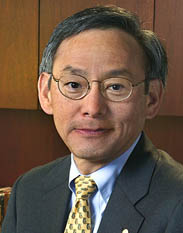 Secretary: Dr. Steven Chu
Secretary: Dr. Steven Chu
Department of Energy
1000 Independence Avenue, SW
Washington, DC 20585
202.586.5000
www.energy.gov
Role: The Secretary decides major energy policy and planning issues; acts as the principal spokesperson for the Department; and ensures the effective communication and working relationships with Federal, State, local, and tribal governments and the public. The Secretary is the principal adviser to the President on energy policies, plans, and programs.
Background: The Department of Energy's mission is to foster a secure and reliable energy system that is environmentally and economically sustainable; to be a responsible steward of the Nation's nuclear weapons; to clean up the Department's facilities; to lead in the physical sciences and advance the biological, environmental, and computational sciences; and to provide premier scientific instruments for the Nation's research enterprise.
Historical Note: The Department of Energy (DOE) was established by the Department of Energy Organization Act (42 U.S.C. 7131), effective October 1, 1977, pursuant to Executive Order 12009 of September 13, 1977. The act consolidated the major Federal energy functions into one Cabinet-level Department.
Agencies under Jurisdiction:
Office of Health, Safety, and Security
The Office of Health, Safety, and Security develops policies to protect national security and other critical assets entrusted to the Department of Energy.
Office of Energy Efficiency and Renewable Energy
The Office of Energy Efficiency and Renewable Energy is responsible for formulating and directing programs designed to increase the production and utilization of renewable energy (solar, biomass, wind, geothermal, alcohol fuels, etc.) and hydrogen, and improving the energy efficiency of the transportation, buildings, industrial, and utility sectors through support of research and development and technology transfer activities.
Office of Fossil Energy
The Office of Fossil Energy is responsible for research and development of programs involving coal, petroleum, and natural gas. The fossil energy program involves applied research, exploratory development, and limited proof-of-concept testing targeted to high-risk and high-payoff endeavors.
National Nuclear Security Administration (NNSA)
The National Nuclear Security Administration (NNSA) was created by Congress through the National Defense Authorization Act for Fiscal Year 2000 (113 Stat. 512) to bring focus to the management of the Nation's defense nuclear security programs.
Office of Science
The Office of Science supports basic research that underpins DOE missions in national security, energy, and environment; constructs and operates large scientific facilities for the U.S. scientific community; and provides the infrastructure support for 10 national laboratories.
Federal Energy Regulatory Commission (FERC)
202.502.8004
www.ferc.gov
The Federal Energy Regulatory Commission (FERC) is an independent agency within the Department of Energy which regulates the interstate transmission of electricity, natural gas, and oil.
Source: United States Government Manual





















